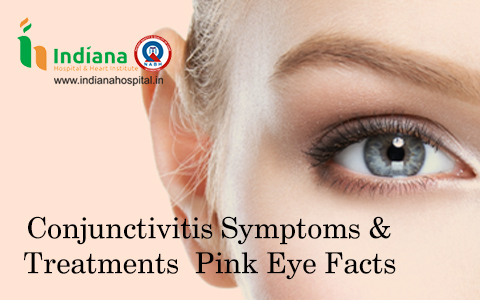Conjunctivitis Symptoms & Treatments | Pink Eye Facts
Conjunctivitis OR pink eye, a common eye disease, is an inflammation or swelling of the conjunctiva, the thin transparent layer covering the eye. Eyes are red, itchy, swollen and sometimes with a sticky discharge.
It may affect one or both eyes. Some forms of conjunctivitis are highly contagious and can easily spread in schools and at home.
A viral or bacterial infection can cause conjunctivitis. It can also develop due to an allergic reaction to air irritants such as pollen and smoke, chlorine in swimming pools, ingredients in cosmetics, or other products that contact the eyes, such as contact lenses. Sexually transmitted diseases like chlamydia and gonorrhea are less common causes of conjunctivitis.

People with conjunctivitis may experience the following symptoms:
- A gritty feeling like something is in your eyes
- Itching or burning sensation in one or both eyes
- Excessive tearing
- Discharge from one or both eyes
- Swollen eyelids
- Pink discoloration to the whites of one or both eyes
- Increased sensitivity to light
- pain
- blurry eyes
Types Of Conjunctivitis
Viral Conjunctivitis
The most common type of pink eye. This conjunctivitis is very contagious and often spreads through schools and other crowded places. It usually causes burning, red eyes with a watery discharge. Conjunctivitis is most commonly caused by the same virus that causes the runny nose and sore throat of the common cold. If your conjunctivitis is caused by a viral infection, there are no specific treatments. Your body fights the virus on its own. Placing a cool, wet washcloth on your eyes can help make them feel more comfortable. In the worst cases, topical steroid drops may be prescribed to reduce the discomfort from inflammation. However, these drops will not shorten the infection.
Bacterial conjunctivitis is an infection most often caused by staphylococcal or streptococcal bacteria from your own skin or respiratory system. Insects, physical contact with other people, poor hygiene (touching the eye with unclean hands), or using contaminated eye makeup and facial lotions can also cause the infection. Sharing makeup and wearing contact lenses that are not your own or are improperly cleaned can also cause bacterial conjunctivitis. Usually, there is a lot of sticky pus in the eye. Antibiotic eye drops are prescribed.
Children are the people most likely to get pink eye from bacteria or viruses. This is because they are in close contact with so many others in school or daycare centers. Also, they don’t practice good hygiene.
Allergic Conjunctivitis
Allergic conjunctivitis occurs more commonly among people who already have seasonal allergies. They develop it when they come into contact with a substance that triggers an allergic reaction in their eyes like pollen or animals etc. The irritation can also come from cigarette smoke, car fumes, pool chlorine or other toxic substances. The main symptom of allergic pink eye is itchy eyes. Other symptoms include red, burning and tearing eyes and puffy eyelids. Allergic conjunctivitis is not contagious
Treatment: The first step is to remove or avoid the irritant, if possible. Cool compresses and artificial tears sometimes relieve discomfort in mild cases. In more severe cases, nonsteroidal anti-inflammatory medications and antihistamines may be prescribed. People with persistent allergic conjunctivitis may also require topical steroid eye drops.
How is conjunctivitis diagnosed?
Conjunctivitis can be diagnosed through a comprehensive eye examination.
Contact Lens Wearers and conjunctivitis
Contact lens wearers may need to temporarily stop wearing their lenses while the condition is active. Your doctor can tell you if this is necessary.
Take Better Care of Yourself | Self Care
Practicing good hygiene is the best way to control the spread of conjunctivitis. Once an infection has been diagnosed, follow these steps:
- Don’t touch your eyes with your hands.
- Wash your hands thoroughly and frequently.
- Change your towel and washcloth daily, and don’t share them with others.
- Discard eye cosmetics, particularly mascara.
- Don’t use anyone else’s eye cosmetics or personal eye-care items.
- Follow your eye doctor’s instructions on proper contact lens care.
You can soothe the discomfort of viral or bacterial conjunctivitis by applying warm compresses to your affected eye or eyes. To make a compress, soak a clean cloth in warm water and wring it out before applying it gently to your closed eyelids.
For allergic conjunctivitis, avoid rubbing your eyes. Instead of warm compresses, use cool compresses to soothe your eyes. Over-the-counter eye drops might also help. Antihistamine eye drops can alleviate the symptoms, and lubricating eye drops can rinse the allergen off the surface of the eye.
